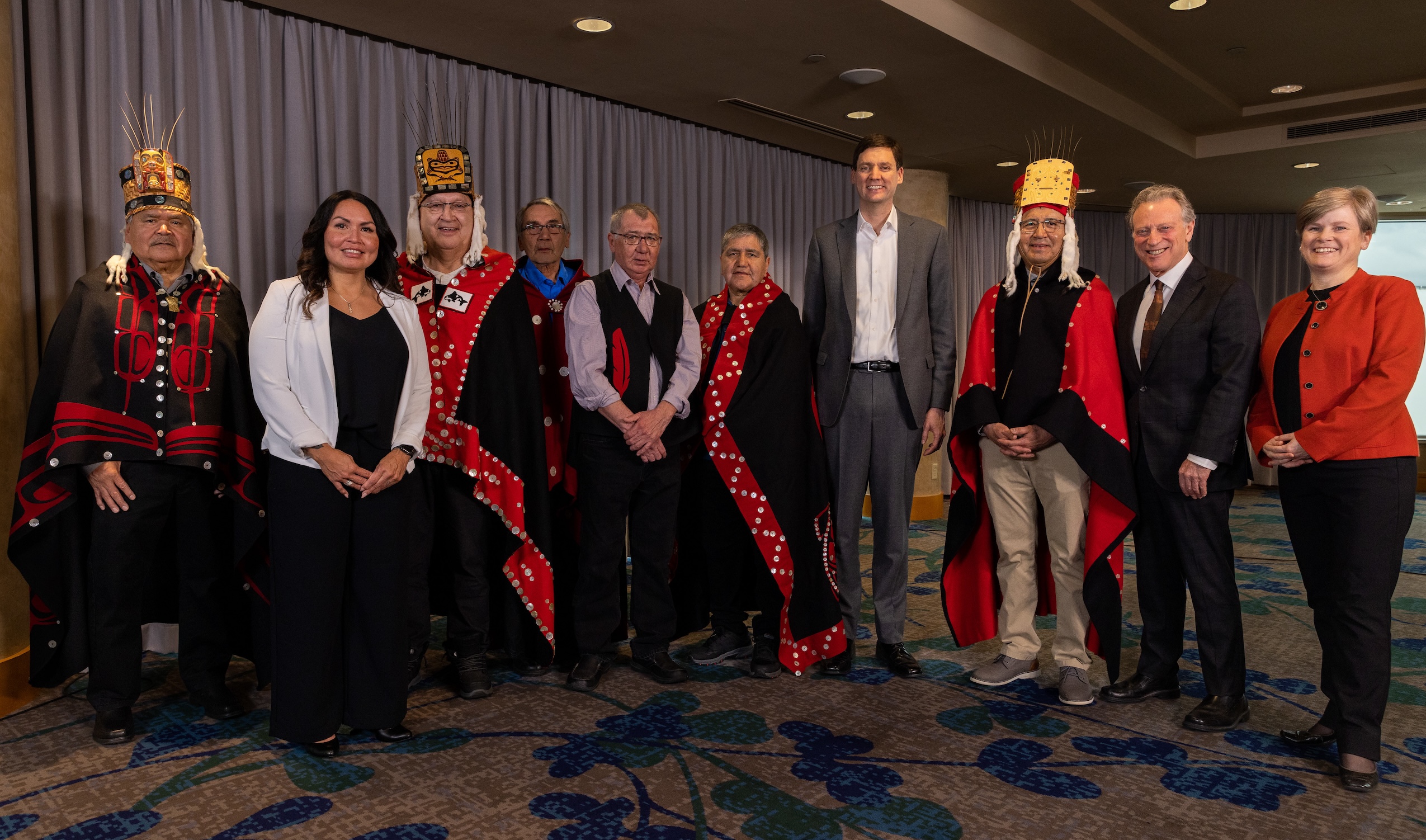
The site of an infamous B.C. mining disaster could get even bigger. This First Nation is going to court — and ‘won’t back down’
Xatśūll First Nation is challenging B.C.’s approval of Mount Polley mine’s tailings dam raising. Indigenous...
Last week, explosive claims made behind closed doors by a fossil fuel industry executive were made public. The claims — about how oil and gas giant TC Energy conducts its business — were made during an insider call at the company, which builds and operates crude oil and natural gas pipelines across North America.
The 42-minute spiel from Liam Iliffe, then a TC Energy executive, was part of a March “lunch and learn” session for 150 external relations employees across the continent. While the company said some of his claims were inaccurate and didn’t reflect how it operates, the leaked recordings have since made international headlines, sparked a probe from the B.C. government into his tactics and prompted harsh rebuke from politicians.
There was a lot to unpack.
Iliffe’s statements were on one of two leaked recordings reviewed by The Narwhal — the other of a separate staff meeting in February. Taken together, they spelled out a multi-pronged strategy TC Energy executives said they used to promote the company’s interests.
On both leaked recordings, staffers made a number of claims about their outsized pro-oil and gas influence over everyone from premiers to Canada’s spy agency to the Wall Street Journal.

The company, Iliffe said, drafted proposed government policies and persuaded “underpaid and overworked” public servants to use them verbatim. It tried to meet politicians in casual settings, chatting in a way that blurs “personal and professional, that advances our initiatives.”
The claims didn’t stop there: Iliffe said the company used Indigenous leaders as “validators.” He said it leveraged relationships with ambassadors to influence Canadian politicians. Staffers also said TC Energy supplied content for the Wall Street Journal, published as though written by its editorial board.
After The Narwhal reached out to TC Energy with questions, Iliffe resigned and said some of the claims he had made were untrue but did not specify which. The company said the recordings “included inaccurate comments from an employee that portray a false impression of how we do business” and were released without authorization. Both the B.C. and federal governments vehemently denied Iliffe’s claims were anything more than bluster.
But overall, the behind-closed-door comments appear to outline at least seven key tactics TC executives claimed to use to influence government and sway public opinion — with “remarkable results.” Read on — and listen! — for seven key strategies, in the words of oil and gas executives.
“A really interesting thing about government is that you’ve got a lot of people, public servants, who are overworked and underpaid. And sometimes they just want the job done for them,” Iliffe said.
“We’ve been given opportunities to write entire briefing notes for ministers and premiers and prime ministers and it gets stuck on government letterhead and put into an envelope and into a briefing package that goes to that elected figure,” Iliffe added.
“There’s nothing more powerful than that.”
That’s something denied by both the B.C. government and Natural Resources Canada. The federal department said briefing notes for high-level political and public officials are “developed by public servants. … External stakeholders have no role in drafting briefing notes, and are not privy to them.”
Iliffe, nevertheless, claimed his strategy had been successful, saying, “We’ve had some really remarkable results in terms of our message being repeated back to us by key decision makers in government.”
You never know which senior government officials you might run into at the produce section at Costco.
That’s an insight Iliffe shared during the internal call.
“You’d be surprised how much work I actually get done in the cooler at Costco because I bump into a significant minister or bureaucrat that I really want to spend some time with and I can do that next to the strawberries or the romaine lettuce,” he said.
“We spend time with influential bureaucrats,” Iliffe said. “They’re the ones who ultimately advise the premier and cabinet and if we can spend time with them and make certain that our messaging and our advice is landing on their letterhead, we have extra more solid validation of the message that we’re sending.”
A senior TC Energy vice president, Patrick Muttart, dismissed claims about Costco lobbying, telling the National Post it “doesn’t happen in the real world” and that the company has a “robust” framework to oversee lobbying, which is governed by laws at both the provincial and federal levels.
“We were able to … mute opposition voices because we have an extraordinary and growing team that really focuses on opposition research,” Iliffe said in March. “They’re based in Washington, D.C. They’re watching over the entire company and can highlight to us what’s in the news, what are opposition folks saying online and give us opportunities to blunt, mute and sometimes even reverse opposition voices.”
“We spend a lot of time influencing the media landscape,” he added. “We have had opportunities to shape stories, place stories, develop positive stories that in some instances as a corporation, try to stop negative stories that either were not true or really, really harmed us in some way that was irreparable.”
A month before Iliffe’s statement, on the other leaked recording, a Washington D.C.-based TC Energy executives took credit for a Wall Street Journal editorial published on Feb. 15, 2024. Titled “Biden’s LNG ‘Gift’ to Vladimir Putin” and signed by the newspaper’s editorial board, it criticized President Joe Biden for announcing a pause on liquefied natural gas exports (that move was blocked by a Republican-appointed federal judge earlier this week).
“I wouldn’t say this much outside the walls of the TC tower, but this editorial wouldn’t have happened without our involvement,” Edward Burrier, a former White House staffer who is now TC Energy’s director of public policy, said on the call. “Our communications team packaged that for the Journal editorial page and they went with it … so some really impactful teamwork there.”
A spokesperson for the Wall Street Journal said the paper does “not comment on sourcing and/or editorial processes.” TC Energy did not respond to questions about the editorial or the opposition research group.
Iliffe claimed TC Energy staffers reached out to “international thought leaders and diplomats” to influence B.C. Premier David Eby when he was first elected. “We know that premiers, when they go to countries, have dinners with ambassadors,” he said. “That’s a one-on-one period of time that an ambassador can deliver our message.”
“Leveraging our relationships allowed us to have Canadian ambassadors abroad deliver a pro-LNG message to a premier who was skeptical at the time.”
He said when Eby and some of his cabinet ministers went to Asia on a trade mission in 2023, TC Energy reached out to ambassadors ahead of time to brief them on desired messaging.
The result, Iliffe said, was “a marked shift in language when [Eby] came home.”
“We have a shift in government position, a clear shift. We have public comments and policy development that are positive for TC Energy’s initiatives being made daily by the British Columbia government. We didn’t find ourselves there a year ago.” Iliffe said the company has worked to shift Eby’s views since October 2022, when he said expanding fossil fuel infrastructure would make climate goals impossible to reach.
A spokesperson for Eby denied Iliffe’s claims, saying they were “self-aggrandizing” with “no basis in reality.” Whether or not TC Energy’s efforts were the cause, Eby released a video last month endorsing the partially Indigenous-owned Cedar LNG project as a “shining example of how natural resource development should work with our province, in full partnership with First Nations, in line with our commitments to fight climate change.”

Global Affairs Canada said Canada’s Trade Commissioner Service – a network of diplomats who promote Canadian businesses from embassies and consulates in more than 160 cities abroad – helps Canadian oil and gas companies “sell their products and services outside Canada.”
Muttart, the senior vice-president at TC Energy, confirmed to the National Post that the company is “informing, educating and engaging with not just Canadian diplomats but other diplomats representing other countries.”
As politicians, cabinets and decision makers come and go, Iliffe said, “we always have to make certain that we’re shoring that up and bringing validators through our relationships — from communities, Indigenous people, Indigenous leaders and the general public — to government.”
The strategy, Iliffe said, would help politicians be “confident that they can make the positive decisions without affecting their voter base which drives a lot of decision making.”
On the February leaked internal call Burrier was asked for advice from a speaker in B.C. who said “we’re really having … problems getting traction with [First Nations]” for the Prince Rupert natural gas transmission pipeline. While TC Energy secured agreements with some First Nations governments along the route of the pipeline when it first sought — and received — approval from B.C. in 2014, not all communities remain supportive.
In response to the question, Burrier characterized Indigenous involvement in fossil fuel development as a competitive edge. As an example, he referred to the Cedar LNG project co-owned by Haisla Nation, and the presence of the nation’s Chief Crystal Smith at a 2023 liquefied natural gas conference in Vancouver as an example.
“Every CEO sits up there and talks about these LNG projects around the world and they all sound the same,” Burrier said. “But then Chief Crystal got up and said, ‘I’m with Haisla Nation and we used to have to manage poverty, now we have to figure out how to manage wealth.’ ”
“That’s the force multiplier, to use one of the words of the hour, that we have on our side.”
Chief Smith did not respond to The Narwhal’s requests for comment.
“We spend a lot of time in that ecosystem shaping media outcomes,” Iliffe said in March.
Iliffe claimed media-influencing tactics had been useful when Wet’suwet’en Hereditary Chiefs were in Toronto in 2023 to protest natural gas development. Iliffe said that because protestors were targeting sources of pipeline financing, TC Energy had to do so as well.

“So we redeployed with a geofence social media campaign to make certain that our financiers were aware that we were aware of it — that they knew we were doing what we were trying to do — and the media covering the event during saw our ads while they opened social media or any news coverage.”
Geofencing is a marketing tactic that consists of targeting ads on devices located within specific geographic boundaries.
His efforts, he said, were “remarkably effective.”
“It really actually did drive some more positive news stories or at least it added balance and in a lot of the times, balance is a win.”
Burrier said one example of “successful shots fired” in Canada was how the company lobbied the federal government around the Impact Assessment Act, through which decision makers consider environmental impacts when approving or rejecting major industrial development projects.
The Trudeau government is amending the act after the Supreme Court of Canada found it to be unconstitutional last fall, but Burrier suggested TC Energy was behind the openness to changes that benefit industry.
“As many on this call will remember, early last year the Canadian government had two sentences in their proposal saying that they wanted to make improvements on its permitting process,” he said in the recording. “We used that as our opening. We produced for government a deliberate, thoughtful, 20-plus-page paper with recommendations.”
“We literally did the government’s homework for them,” he added.
A spokesperson with the Impact Assessment Agency said the agency “did not receive any submissions from TC Energy on amendments to the Impact Assessment Act.”
When asked by The Narwhal about the claims, federal Environment Minister Steven Guilbeault said Burrier’s statement is “an outrageous claim and it’s so preposterous.”
Get the inside scoop on The Narwhal’s environment and climate reporting by signing up for our free newsletter. When I visited my reserve, Moose Factory,...
Continue reading
Xatśūll First Nation is challenging B.C.’s approval of Mount Polley mine’s tailings dam raising. Indigenous...

As the top candidates for Canada’s next prime minister promise swift, major expansions of mining...

Financial regulators hit pause this week on a years-long effort to force corporations to be...

